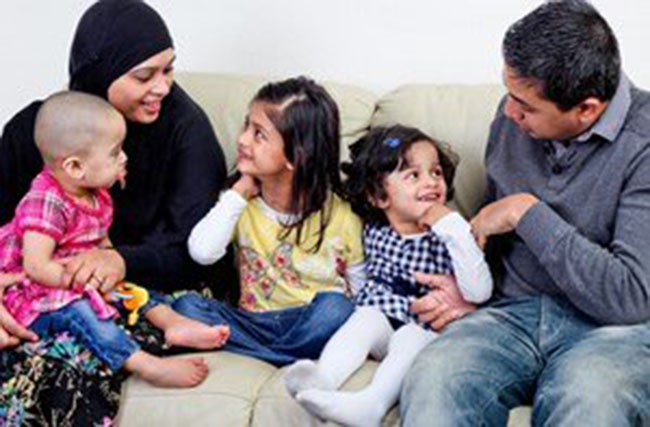 DISABLED children and their families have had vital care and support withdrawn during the coronavirus pandemic, according to an extensive survey by more than 70 disability charities.
DISABLED children and their families have had vital care and support withdrawn during the coronavirus pandemic, according to an extensive survey by more than 70 disability charities.
In 76% of cases support has stopped completely, leaving parents and young siblings taking on all care responsibilities around the clock.
The study, by the Disabled Children’s Partnership, found that disabled children’s friendships, learning, communication, behaviour and mental and physical health have suffered.
Parents already struggling before the pandemic, feel locked out during lockdown, abandoned by society and fearful for their own physical and mental health.
Amanda Batten, chair of the DPS, said: “Our survey reveals that families of disabled children feel abandoned in lockdown, dealing with intense pressures as support is stripped bare.
“As many begin to emerge from lockdown, spare a thought for those left in it. Families with disabled children are crying out for more support. Education support, therapies, respite and equipment have all been reduced or inaccessible. Families have filled this void for 12 weeks but it is neither ethical nor sustainable for much longer.
“The health and social care system was already in crisis, without the resources to support disabled children. It will be even more stretched in future. The Government needs to start planning now for enhancing funding for disabled children’s health and social care so that they are not left even further behind their peers.”
- The survey of 4,074 parents found that:
Most parent carers (72%) are providing a lot more care compared with the amount before lockdown. Just over two thirds (68%) said non–disabled siblings were also providing a lot more care - For those who had previously received support, 76% have seen it stop
Half of parents whose children had been receiving crucial therapies or other extra support have seen this stop. 86% say lockdown has had a negative impact on their disabled children’s learning and communication - Lockdown has led to some parents not seeking necessary medical health for their disabled children (44%), themselves or their partner (54%) or their non-disabled children (17%).
- Nearly half (45%) say their disabled children’s physical health has declined and 54% say the same about their own health
The majority (70-80%) report worsening emotional and mental health for both their children and themselves - The majority (70%) of parents whose children were eligible for a school place had not taken them up; mainly because of concerns about their children’s health or because the right provision was not available
Before the surprise shielding announcement on 29 May:
- 62% of families said they agreed or strongly agreed that Government information about shielding is confusing
- The majority (64%) of parents were worried about how much home schooling they were doing with their disabled child and 32% said they were receiving no support specific to their child’s needs from school; on the other hand, a quarter were getting good support
- 83% say lockdown is having a negative impact on their disabled child’s friendships
Lockdown is impacting on the statutory rights of disabled children – two-thirds going through an assessment process had seen it delayed; 43% of annual reviews had lapsed or been put on hold - Families are facing financial pressures, through either, or both, a reduction in income (39%) or increased costs (61%). One in five (21%) said they will go into debt as a result
WHAT PARENTS SAID:
“The impact is huge: absolutely no break from caring. It’s really, really intense and quite overwhelming and you’re just left to it, no one seems to want to have the debate or talk about those with children with complex needs how they’re dealing with it.
“It isn’t just home-schooling it’s living, breathing physio, communication, lifting, feeding, stimulating, interaction, trying to keep yourself sane, home-school another child. The list is non-stop and endless and no one to help or make you feel like they actually care by checking on you.”
“It’s like living in a pressure cooker. It’s constantly and endlessly exhausting.”
“Huge impact. We now have no respite and no break from 24/7 care needs. Plus we are expected to home school two children, including modifying home-schooling for a visually impaired child. We have no therapy intervention at all. This has been detrimental to my SEN child’s progress and health. We are all completely exhausted both physically and mentally.”
THE STATISTICS
- There are 925,000 disabled children in England.
- Before lockdown the Disabled Children’s Partnership identified a £1.5 billionfunding gap in health and social care for disabled children.
- A 2019 DCP survey of 3,000 families found that only 4%felt they had enough support to care for their disabled children safely.
- Census data indicates disabled children more likely (compared to other children) to live in a household without a car, in a home without central heating, and in overcrowded housing.
- Disabled children are likely to live in larger households.
- Before lockdown nearly a quarter (24%) of parent carersprovided 100 plus hours of care every week – the equivalent of working three full time jobs.
Ian Noon, head of policy at the National Deaf Children’s Society, said: “This survey shows the impossible battle that many parents of disabled children face on a daily basis. The support these children receive is crucial, yet despite the best efforts of many professionals, families are being left to cope alone.
“The Government has shown during the coronavirus pandemic that it can introduce radical changes in a matter of days. Moving forward, we will need that same innovation, ingenuity and urgency to make sure every child gets the support they need and the future they deserve.”
NDCS Helpline 0808 800 8880 …. www.ndcs.org.uk/livechat

